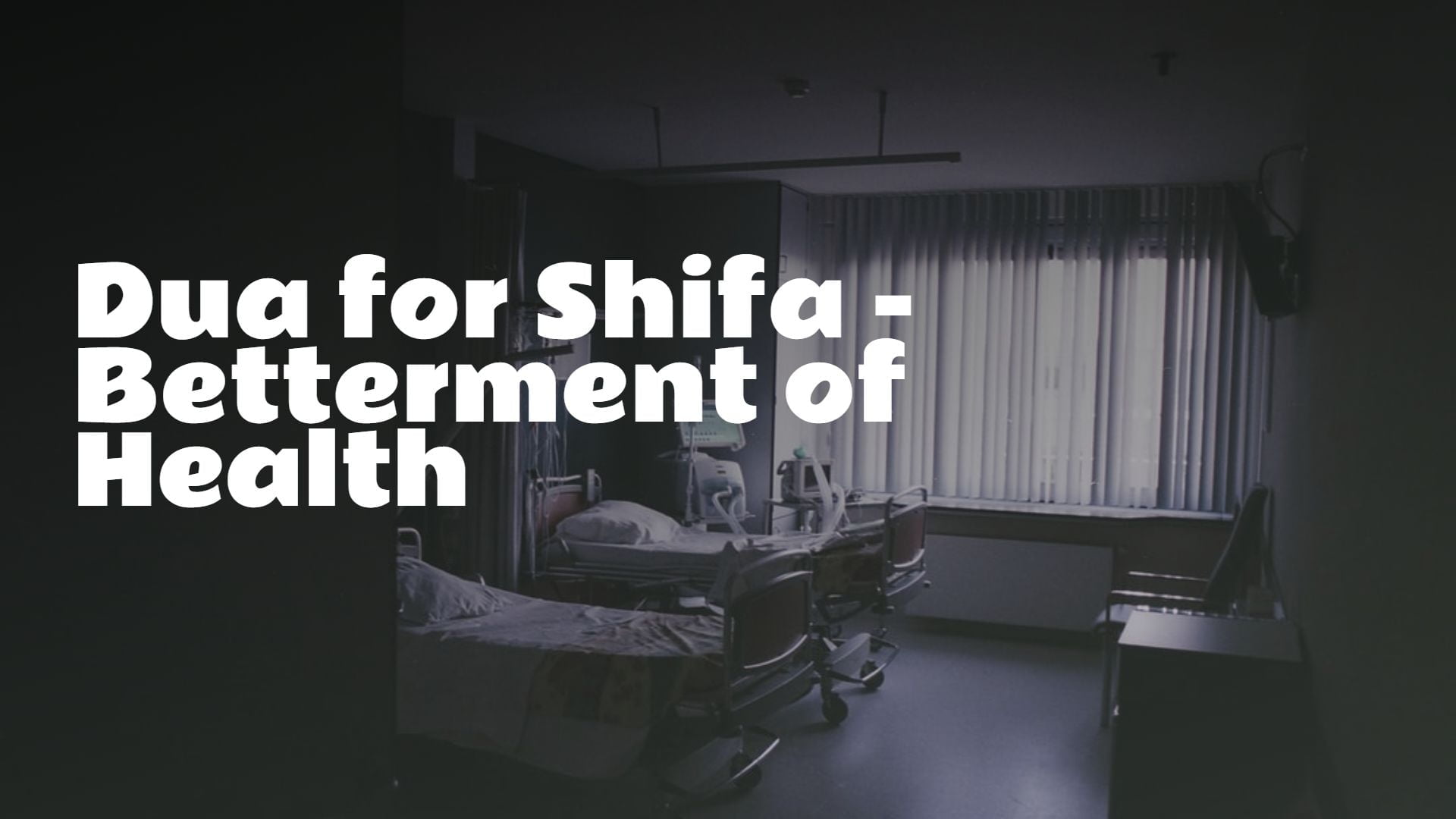Healing and health are among the ultimate blessings we seek in life. When we or our loved ones face illnesses or ailments, the heart naturally turns to prayer, hoping for relief and restoration. In Islam, supplication (dua) is a powerful means of connecting to Allah for mercy, strength, and cure. The concept of Shifa (شفاء), meaning healing or cure, holds a profound place in the Islamic tradition. The Quran and Hadith contain many references to duas that the Prophet Muhammad (peace be upon him) taught for health and healing.
This article explores the importance of duas for shifa, their spiritual and practical aspects, examples of specific duas for healing, and their role in fostering hope and patience during trials of sickness.
Understanding Shifa in Islam
Shifa literally means cure or healing — a restoration to health physically, emotionally, or spiritually. Islam teaches that Allah is the ultimate healer, and while medicine and treatment are means created by Him, sincere supplication remains one of the most powerful tools for recovery. According to a Hadith, the Prophet Muhammad (peace be upon him) said:
“Make use of medical treatment, for Allah has not made a disease without appointing a remedy for it, with the exception of one disease, namely old age.”
— Sahih al-Bukhari and Sahih Muslim
This statement beautifully balances trust in medicine and reliance on Allah’s mercy. Duas for shifa are acts of devotion that strengthen faith, ease the heart’s distress, and invite divine intervention.
Why Supplicate for Healing?
-
Spiritual Connection: Dua is a direct, personal conversation with Allah, reflecting humility and trust.
-
Psychological Comfort: Repeating healing duas calms the mind, reduces anxiety, and fosters hope.
-
Faith Reinforcement: Acts of devotion during hardship deepen a believer’s patience and resilience.
-
Blessings and Mercy: Supplications bring layers of barakah (blessings) that can impact recovery.
Prophetic Duas for Shifa

Many duas were taught by the Prophet (PBUH) for healing physical and spiritual ailments. These serve as a blueprint for our own prayers.
1. Dua for General Healing
The Prophet used to say this supplication seeking healing from every illness:
“Allahumma rabban-nas, adhhib al-ba’sa, washfi anta ash-shafi, la shifa’a illa shifa’uk, shifa’an la yughadiru saqaman.”
اللهم رب الناس أذهب الباس، واشف أنت الشافي، لا شفاء إلا شفاؤك، شفاءً لا يغادر سقما
Translation: “O Allah, Lord of mankind, remove the harm and heal, You are the Healer; there is no healing except Your healing, a healing that leaves no illness behind.”
— Sahih al-Bukhari
This dua emphasizes Allah’s singular power to heal completely and perfectly.
2. Seeking Healing from Specific Diseases
For those suffering from fever, the Prophet (PBUH) recommended:
“As’alullaha ‘azza wa jall an yashfiyaka.”
أسأل الله العظيم رب العرش العظيم أن يشفيك
Translation: “I ask Allah, the Mighty and Majestic, to cure you.”
— Sahih Muslim
Similarly, the Prophet supplicated for healing from other specific ailments, showing the importance of addressing both general and particular conditions in dua.
3. Ruqyah (Spiritual Healing Prayers)
Ruqyah refers to Quranic verses and divine names recited for protection and healing. Some effective verses include:
-
Ayat al-Kursi (Surah Al-Baqarah 2:255)
-
The last two verses of Surah Al-Baqarah (2:285-286)
-
Surah Al-Falaq and Surah An-Nas for protection against harmful influences
Reciting these verses along with the associated duas is a Sunnah practice.
4. Dua from the Quran
The Quran contains healing duas, such as the prayer of Prophet Ayyub (Job) during his illness:
“…La ilaha illa anta subhanaka inni kuntu mina ath-thalimin.”
لا إله إلا أنت سبحانك إني كنت من الظالمين
Translation: “There is no deity except You; exalted are You. Indeed, I have been of the wrongdoers.”
— Surah Al-Anbiya 21:87
This dua reflects humility and turning sincerely to Allah for mercy and shifa.
How to Incorporate Duas into Daily Healing Practice
-
Consistency: Repeat the duas sincerely and regularly during times of difficulty.
-
Belief: Have firm conviction that Allah can and will heal.
-
Supplement with Treatment: Use medical remedies as a means while maintaining spiritual efforts.
-
Patience and Acceptance: Healing may take time; maintain trust in Allah’s plan.
-
Encourage Others: Praying for others and making collective duas boosts morale.
Additional Duas for Healing
-
Dua for the sick person:
“As’alu Allahal ‘azim rabbal ‘arshil ‘azim an yashfiyaka.”
أسأل الله العظيم رب العرش العظيم أن يشفيك
Translation: “I ask the Mighty Allah, Lord of the Mighty Throne, to cure you.”
-
Dua to relieve pain:
“La ba’sa tahoorun insha’Allah.”
لا بأس طهور إن شاء الله
Translation: “No harm, it is purification, God willing.”
-
Dua of Prophet Muhammad when someone is sick:
“O Allah, grant him healing that is complete and restore him to good health.”
اللهم امنحه شفاءً تامًا وردّه إلى صحة جيدة
Spiritual and Psychological Benefits of Duas for Shifa
Beyond physical cure, duas for shifa nurture mental and spiritual strength:
-
Reduces Anxiety: Supplications ease fear of illness.
-
Instills Hope: Encouragement to view hardship as a test.
-
Strengthens Faith: Reminds believers of their dependence on Allah.
-
Promotes Forgiveness: Many duas include seeking forgiveness for sins, as sins can be a source of spiritual and even physical affliction.
Role of Faith and Intention in Healing
In Islam, faith and intention (niyyah) are integral to the healing process. Sincere intention in making dua and believing fully in Allah’s power aligns one with divine mercy. This spiritual dimension enhances overall well-being and recovery chances.
FAQs
Can dua alone cure illness without medical treatment?
Dua is a powerful spiritual tool and Allah can heal with or without medicine. However, Islam encourages seeking medical treatment alongside supplication as complementary means.
How often should one recite healing duas?
There is no limit; frequent, sincere recitation is recommended. Regular morning and evening supplications are beneficial.
Are there specific times when duas for shifa are most accepted?
Yes, including after obligatory prayers, during the last third of the night, between Adhan and Iqamah, and on Fridays.
Can one make dua for someone else to be healed?
Yes, praying for others' health and shifa is highly recommended and encouraged.
What else can be done alongside duas to gain healing?
Maintain good hygiene, eat nutritious food, exercise, take prescribed medicine, and practice patience and gratitude.
Conclusion
Duas for shifa encapsulate the beautiful synergy between faith and medicine, reliance on divine mercy, and proactive healing efforts. They provide spiritual sustenance through patience and hope when battling illness. While medical treatment should not be abandoned, incorporating duas into the healing journey brings comprehensive comfort to body and soul. The prayerful approach reflects submission, gratitude, and trust in Allah’s wisdom, reminding us that ultimate cure comes from Him alone. As believers, practicing these duas instills a deep sense of healing beyond the physical — restoring peace and balance in challenging times.


